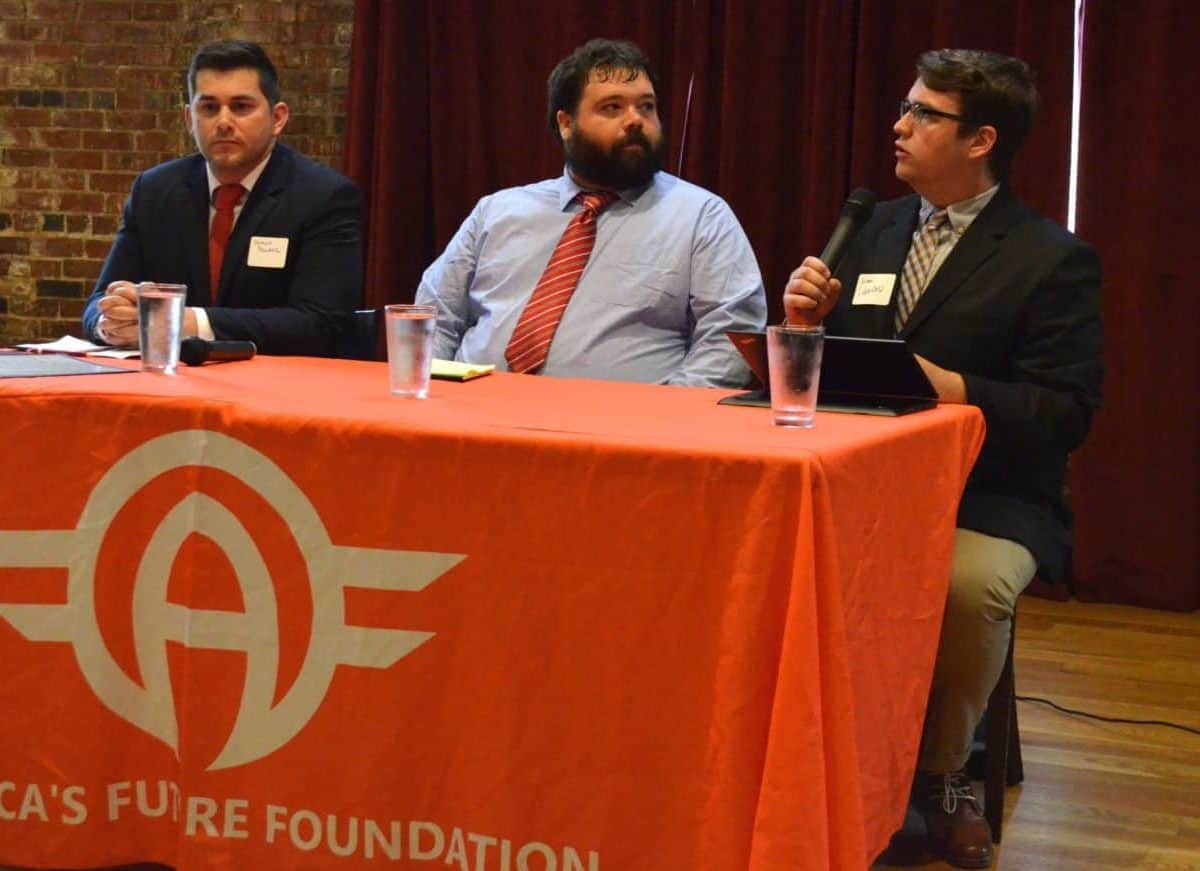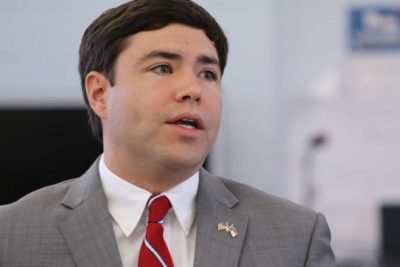

A Republican, a libertarian and a Democrat walked into the Tobacco Road Sports Cafe Monday night, and while that might sound like the set up of a joke, it was actually the beginning of a serious discussion about education.
Republican Aaron Littlefield, a science teacher in Jackson County Public Schools; Libertarian Nick Taylor, a social studies teachers in Rocky Mount and candidate for district 25 of the North Carolina House of Representatives; and Democrat Shaun Pollenz, an attorney and candidate for Wake County Board of Education District 3, discussed their thoughts about everything from teacher pay to administrative bloat at the event hosted by America’s Future Foundation (AFF).
AFF is a group focused on developing the “next generation of conservative and libertarian leaders,” according to its Facebook page. Chaz Cirame, treasurer of AFF’s Board of Directors, was previously vice president of membership, meetings, and public affairs for the American Legislative Exchange Council (ALEC), which receives funding from the conservative Koch Brothers.
The three panelists started out by telling a little about themselves and their thoughts on education.
Littlefield discussed the bureaucratic inefficiencies present in the state’s educational system and his desire for education to look completely different in 20 to 25 years from the way it is now. Taylor talked about the need for more inside educator voices when it comes to education policy, and Pollenz said that while he isn’t an educator, his goal on the Wake County School Board would be to act as a voice for teachers.
All three candidates agreed on the need for public education to better prepare students for the new jobs of the future. On the specifics of what needed to be done on several issues, each candidate had their own take.
On the issue of teacher pay, Littlefield said that beginning teacher pay of $35,000 is better than the median income in North Carolina though he acknowledged that some more veteran teachers are not being taken care of by the state.
“I think by and large, North Carolina is doing a good job of taking care of their teachers,” he said.
Taylor noted that in many districts a lot of education funding come from localities and that parents and students need to have more of a say in how that’s spent. He also stressed the need for more and better public/private partnerships.
Pollenz said that Wake County is doing fairly well at adequately funding schools but hasn’t been as good with outreach to businesses looking to locate here. He also criticized policies that pass students who aren’t prepared for the next grade level.
“I think if you fail one kid, that’s one kid too many,” he said. “There are ways that we can do better, and we’re just not looking at those ways,” he said.
The three candidates discussed the burden of testing in schools today, with Littlefield saying that he thinks testing benefits test makers more than anyone else.
“I really think we need to reexamine testing as a whole,” he said.
Taylor said that some measurement is needed in schools, but that there is a disconnect between the test makers and the people who make the objectives for students.
“We need to analyze it and figure out what’s working and what’s not,” he said of the testing system.
Pollenz talked about when he was growing up as a student in Wake County Public Schools how he had to take a writing test. He said that writing tests have been replaced today by multiple choice exams, which he said aren’t as good.
“I guess my problem with the testing is you only get so much benefit from multiple choice,” he said.
When discussing administrative and support staff and whether school systems are too top heavy and not focused enough on teachers, Littlefield stressed the importance of these staff, particularly mental health professionals. But he said that schools can partner with nonprofit and for-profit organizations to take care of some of those needs.
“It doesn’t necessarily have to be a state employee or a county employee,” he said.
Taylor recognized the need for administrative staff, but said that school systems need to think about what their priorities should be. For the cost of an administrator, a district might be able to hire multiple teachers, he said.
“Right there, we have to decide, where are we going to get the most bang for our buck,” he said
Pollenz talked about the shortage of nurses and mental health professionals in schools, which he said has been a hot issue since the spate of recent school shootings. He also pointed out that concern over school shootings isn’t new, and yet necessary changes haven’t been made.
“Still we’re in a situation where we’re really not addressing the needs of the students,” he said.
He said the state needs to do better with funding and equipping those kinds of positions.
All three panelists were asked what one change they would make if they had a magic wand. Littlefield said he would get rid of the Prussian model of education that the country’s system is based on. Implemented in the 1900s, he said this model was focused on preparing students for industrial work, a situation far removed from the experience of students today. He said students shouldn’t be grouped according to what year they were born in, and education should be more competency- and mastery-based. In short, he said he wanted to change everything.
“Shake up the Etch A Sketch, and do a Picasso,” he said.
Taylor agreed with Littlefield and added that the state needs to give serious consideration to what standards they want North Carolina students to learn. He emphasized the need to talk with outside organizations like businesses, college, universities and others and find out from them “What do we need to do to better prepare our students for the future and for today?”
Pollenz said he had a lot of items on his wish list, but if he could say only one then he would want teachers to better represent the students they teach.
“I think the easiest way is to find a way to make our classroom leaders reflect the diversity of the students,” he said.
Education is always a hot topic when it comes to politics in North Carolina. In the wake of teacher protests and rallies around the country, educators are casting their hats into the political ring. Taylor is just one teacher representing the desire of educators to be more directly involved in policy-making decisions.
According to Education Week, more than 100 teachers around the country are running for state office this November.


